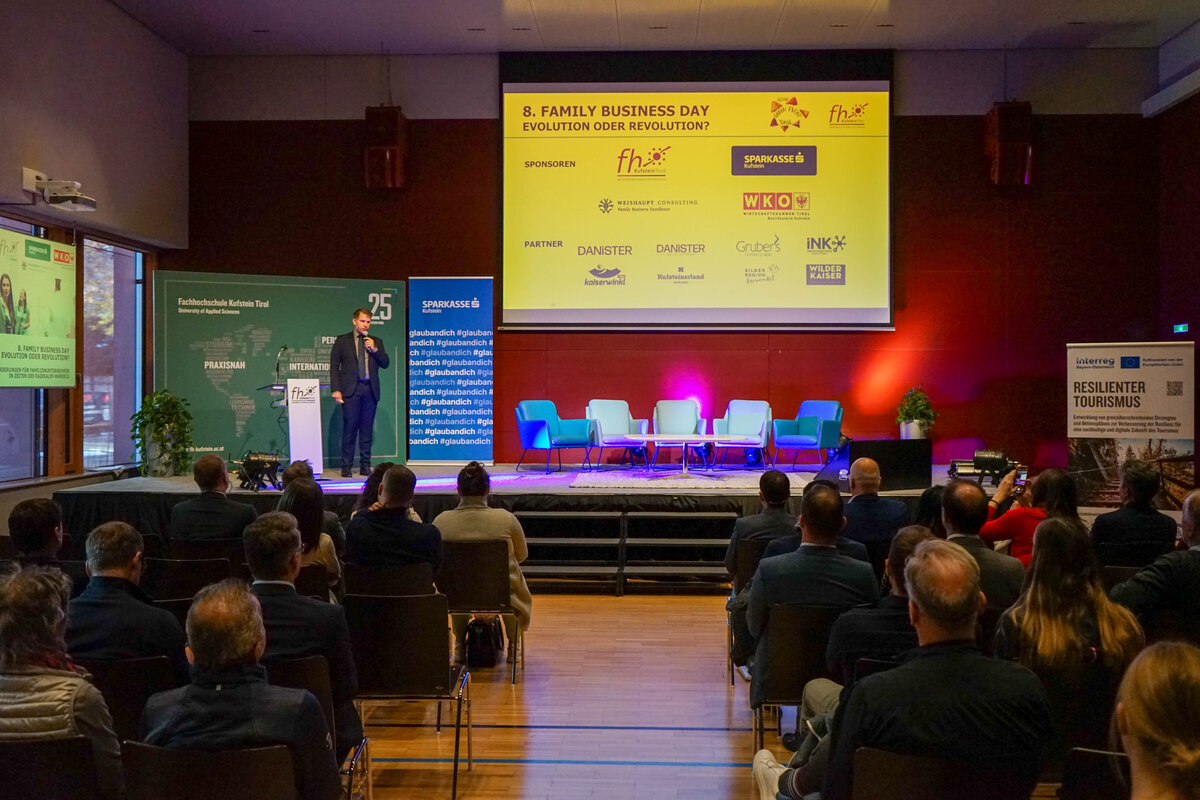Defying the crisis: How family businesses stay successful
- 03.12.2024
- Event Review

Focus on family businesses: exciting insights at the Family Business Day in the ballroom of the University of Applied Sciences Kufstein Tirol.
Family businesses are the backbone of the economy. But how can they overcome labor shortages and crises? Part 1 of the series on the Family Business Day at Kufstein University offers exciting insights and practical solutions.
The economic situation is currently the subject of many discussions in Austria – and probably also beyond the borders of the Alpine Republic. Family businesses are feeling the effects particularly strongly. So what can be done to face radical changes? At the 8th Family Business Day, which took place on November 22 in the ballroom of the FH Kufstein Tirol, top-class experts, entrepreneurs and researchers went in search of clues. This article is the first of a two-part series on the key findings of the Family Business Day.
CONSIDERABLE BACKLOG IDENTIFIED
At the beginning of the event, Prof. (FH) DDr. Mario Situm addressed the large audience with introductory words. He outlined the topic of the day: Challenges for family businesses in times of radical change. Situm went into detail about the six waves of the industrial revolution, which are moving ever faster. The current wave - that of digitalization - should actually be over by now. However, according to Situm, many companies still have a lot of catching up to do. "The green transformation," said Situm, "is the next wave, but one that still receives too little attention in many companies." In this context, he referred to the GREENE 4.0 project at Kufstein Uni, which aims to support companies in their green transformation.
For Situm, it is of crucial importance that family businesses not only work well at the operational level, but are also able to survive in the long term. A central point for family businesses is that they “are passed down through generations,” says Situm.
“STRATEGY IS SOMETHING WE DECIDE TODAY”
Prof. (FH) Mag. Markus Weishaupt, an expert in corporate governance, then spoke about the five dimensions of the holistic development of family businesses. He particularly emphasized that many companies confuse strategy with declarations of intent. “Strategy is not something that happens tomorrow, but something that we decide today,” explained Weishaupt. A company must be aware of its core competencies, from which it creates its competitive advantage. It is equally important to be clear about which business model will ensure future profits..
The leadership culture was also discussed: “If we say that there is a bad corporate culture in a good leadership culture, then we might as well believe in Santa Claus,” said Weishaupt. These two levels – leadership and culture – are inextricably linked. Managers often face a dilemma between the interests of employees and those of the company. “No manager has ever fallen from the sky,” said Weishaupt. He emphasized the need for in-depth training in leadership and the importance of family constitutions that clearly define what the family expects from the company.
SUCCESS THROUGH CLEAR BRAND STRATEGY
Mag. Daniela Kapelari-Langebner, managing director at Ölz Meisterbäcker, gave insights into the success story of the company, which is run by the family in the third generation. She outlined the company's journey from a small bakery to an internationally operating brand with a turnover of 267 million euros. She placed a particular focus on the importance of continuity in management and the development of a clear brand strategy. Sustainability also played a major role, for example in the use of free-range eggs.
Kapelari-Langebner explained that the Ölz Group had developed a clear vision over the past two decades, which had strengthened its market focus and optimized its production methods. In doing so, it had been particularly important to also produce the top sellers itself – a strategy that had helped to keep the value chains directly within the company.
